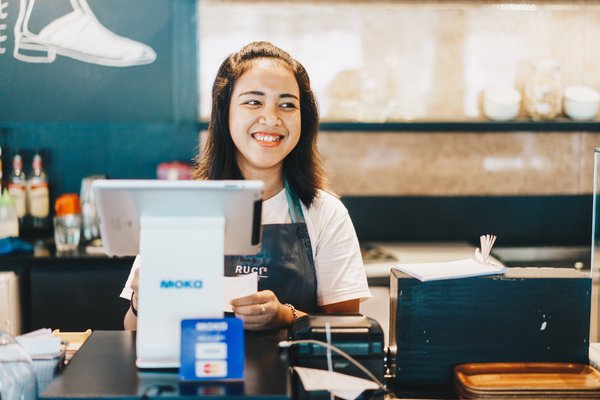JAKARTA, Indonesia, April 29, 2020 /PRNewswire/ -- Moka, a digital Point-of-Sale (POS) startup in Indonesia, introduces the latest business insights and data during the month of Ramadan amid the COVID-19 pandemic in Indonesia. Access to data and interactive discussions will provide three major business insights, namely the spending habits of the F&B industry, retailers and services during Ramadan; anticipation and strategies by brands amid the COVID-19 pandemic; and the changing behavior of consumers due to COVID-19. In line with Moka's drive to grow and develop together with SMEs, the first educational webinar themed A Cup of Moka (ACOM) is expected to provide SMEs the insights to boost their business performance, particularly during this challenging period.

Throughout the COVID-19 pandemic in Indonesia, daily revenue losses in several industries are unavoidable. In the F&B industry alone, daily business revenues were down more than 40 percent, with one out of every three F&B businesses in Indonesia suffering significant losses during the COVID-19 pandemic. However, data from Moka show that delivery services were up by as much as 30 percent.
Based on consumption trends during Ramadan prior to the COVID-19 pandemic, there had been up to a 67 percent rise in the amount of F&B outlets operating between 2 and 4 a.m. During these hours, consumers would tend to choose practical food for their sahur (pre-dawn meal) and purchase up to five products during each transaction for group servings. In the fashion retail industry, there had been up to a 50 percent revenue increase, where the most popular items sold during Ramadan would be tunics, hijabs and Islamic gowns, which would see sales gradually decline after Ramadan. In contrast to the retail industry, beauty services would instead enjoy higher revenues by up to 54 percent one month after Ramadan. This shows that the public tends to seek beauty treatments once Ramadan concludes.
Although consumption patterns in Indonesia will change due to the COVID-19 pandemic, trends during last year's Ramadan cannot be entirely disregarded. Moka Data Analyst Hutami Nadya said that one strategy that merits focus is online shopping. To maximize shopping that makes use of delivery services, whether in the F&B as well as the service and retail industries, businesses can innovate by issuing special delivery menus that can be processed and cooked by the consumers themselves, thereby ready at specific moments such as sahur and when breaking-the-fast with the family at home. This also applies in the retail and service industry, where businesses can introduce special packages to drive consumers to purchase online and allow for services to become products that can be used by consumers at home. "Businesses may take note of trends in society. For instance, for the purpose of cooking at home, F&B merchants are shifting to provide ready-to-cook food ingredients while providing the option of delivery services to support social distancing. Additionally, Ramadan is the right moment to share with those who need more. We can start by adding the option of a menu to be donated to those in need. To record positive cashflow, merchants may also apply the pay-it-forward scheme for customers." Pay-it-forward is a scheme that allows customers to purchase in advance product or service packages from a business, where the benefits can be enjoyed until a certain period ahead. Businesses would usually offer price reductions in the form of coupons for customers. This scheme is expected to assist businesses to book positive cashflow for such purposes as rent, employee salaries, business capital installments, insurance, supplies of raw materials, repairs and other expenses.
About Moka:
Trusted as the operating system of 40,000 merchants across 200 cities in Indonesia, Moka provides businesses of every size with powerful tools to run and grow, with an end-to-end solution that consists of POS, payments, loyalty, accounting, ingredient procurement, and business loans.
On the back-end, Moka creates sales and gross profit reports across multiple outlets, tracks inventory, receives feedback from customers, and provides analytics to track top-selling items, store peak hours, product availability, employee activities, customer behavior, and much more. At the storefront, Moka provides a point-of-sale platform and an integrated digital payment solution for cashiers and storekeepers that can be downloaded on Android and iPad. Owners can access this data anytime and anywhere, so they always have up to date analysis at their fingertips.
Moka was founded in 2014 by Haryanto Tanjo and Grady Laksmono. The company provides a complete suite of products encompassing Moka Pay, Moka Fresh, Moka Capital, and Moka Connect to complement its POS services designed for MSMEs and large enterprise users.
Photo - https://photos.prnasia.com/prnh/20200429/2789721-1?lang=0